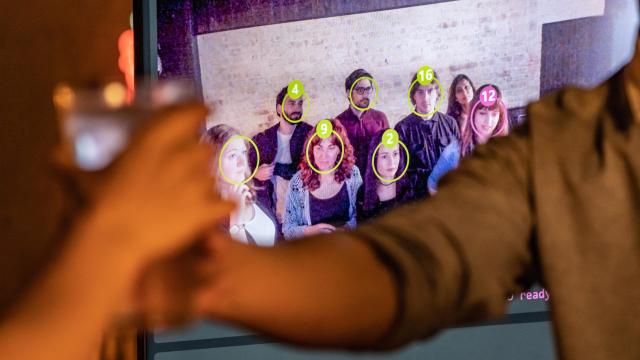Facial recognition systems have, to date, proven to be biased, unjust, flawed and deeply powerful. They’ve been deployed as tools of surveillance, oppression, and authoritarianism. And now one is going to track your drunk arse at the bar.
The system, called “AI Bar,” was developed by British data science company DataSparQ, and it uses facial recognition to identify when someone approaches a bar, logging their face on a video screen and adding them to a running queue. The service uses a standard webcam and a display screen, according to a press release from the company.
Here’s how it works: you walk up to the bar. A camera identifies your face, throws it up onto a screen that faces toward the patrons with a little green circle around it. It adds you to the queue, also visible on the screen, with your number in line and estimated wait time based on the drinks ordered ahead of you and the amount of time they’ll likely take.
Based on a video promoting AI Bar, there will also be an icon next to your face if the system flags you as appearing under 25, which will prompt the bar staff to check their ID. And the company stated in the release that another feature called “FaceTab” will add people’s faces to a bar tab so that only those identified can put drinks on that bill.
The system also memorises someone’s drink orders, the company claims, and can remember your face for “a short period of time” in the event that you briefly abandon your position at the bar. The company also claims in the video that “no facial images are stored,” but in a press release, states that faces and data aren’t kept and are “deleted within 24 hours,” implying that, perhaps for a short window, that information is stored somewhere. We have reached out for comment on where it is stored and how the company ensures it is stored securely.
A DataSparQ spokesperson told Gizmodo in an email that the live video feed of the bar on the display screen aren’t stored, they are streamed and in-memory. However, they did say that a thumbnail of the image of someone’s face shown on the right-hand side of that display screen is stored locally and deleted at the end of that session. “In most cases we’d expect this to be at the end of the night,” the spokesperson said.
The spokesperson said that these images are sent to the Microsoft Azure cognitive services cloud in Western European data centres to an API “that responds with IDs and similarity scores that allows us to generate the queue,” but that these IDs and images are deleted locally and from the cloud when the session ends.
If someone wants their information deleted before the end of a session, they would need to ask the bar staff to remove their image and ID using the app, the spokesperson said, and if they wanted to stay at the bar without being surveilled by the system, “they’ll have to stay out of shot.” They said that they would expect to have signs indicating that they are out of the camera’s scope, citing a strip on the floor, “enter this zone to join the AI bar queue”, as an example.
The spokesperson also said that the accuracy of the facial recognition system is over 80 per cent, and if it does fail and identify the same person twice (perhaps they took their sunglasses at some point), the bartender uses the app to correct the mistake “so the machine learns.”
The stated purpose of the technology is admirable — making lines at bars less hellish and helping pubs remain opened by getting more drinks into people’s hands (and in turn, more money in their pockets). John Wyllie, Managing Director of DataSparQ, said in the press release that they are in talks to roll out the system nationwide in the next year.
Lines do suck, and in a crowded bar, there’s hardly an orderly and fair system when it comes to who gets served first. But there’s nothing quite as sobering as seeing your thirsty face beamed onto a screen for all of your fellow bar-goers to see. Minimising chaos is not an inherently ignoble cause, but installing facial recognition systems at a place of leisure to achieve that goal is merely displacing an accepted social nuisance with an unsettlingly dystopian vibe.
Let’s also recognise this for what it is: The first step in automating bartending.
And, frankly, going out and getting a little shitty with your friends at the bars comes with the expectation of some disorder. While it might be a bit of a deep sigh elbowing your way to the front of the bar, it pales in comparison to a bleak new reality of powerful surveillance systems enforcing law and order.
